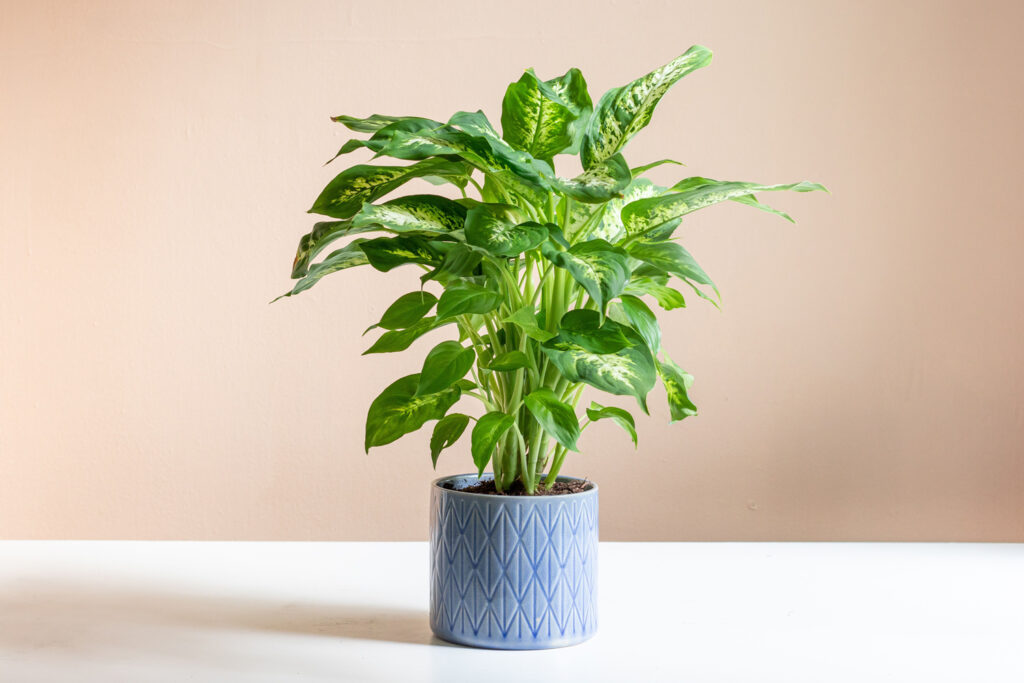Art of Dieffenbachia Care – Dieffenbachia plants, with their vibrant leaves and allure, have become a favorite among plant enthusiasts. Nurturing these tropical beauties requires a delicate balance of care and attention. In this comprehensive guide, we will unravel the mysteries of Dieffenbachia plant care, exploring every facet to ensure your plant thrives.
Understanding Art of Dieffenbachia Care

Dieffenbachia is a genus of plants native to South America. Known for their broad, variegated leaves, these plants add a touch of elegance to any space. Let’s embark on a journey to understand the art of Dieffenbachia plant care.
Choosing the Right Location -Art of Dieffenbachia Care
Selecting an appropriate spot is paramount in Dieffenbachia plant care. These plants thrive in indirect sunlight. Avoid exposing them to direct sunlight, which can scorch their delicate leaves. Opt for a location with filtered or low light, ensuring a perfect balance.
Watering with Precision
Watering is an art when it comes to Dieffenbachia. Keep the soil consistently moist but not waterlogged. Overwatering can lead to root rot, a common issue faced by plant enthusiasts. Allow the top inch of soil to dry out before watering again.
Soil and Repotting -Art of Dieffenbachia Care
Dieffenbachia plants prefer well-draining, rich potting soil. A mixture of peat moss, perlite, and sand creates an ideal environment. Repot your plant every 2-3 years or when it outgrows its current container. Refreshing the soil provides essential nutrients and space for growth.
Temperature and Humidity
Maintaining the right temperature and humidity level is crucial. Dieffenbachia thrives in warm, humid conditions. Keep the room temperature between 60-75°F (15-24°C) and ensure adequate humidity. Regular misting or placing a humidifier nearby can create an optimal environment.
Pruning and Propagation -Art of Dieffenbachia Care
Pruning is essential for shaping your Dieffenbachia plant and encouraging bushier growth. Remove yellowing or damaged leaves to stimulate new growth. Propagation can be done through stem cuttings. Dip the cut ends in rooting hormone and plant them in moist soil for propagation success.
Dealing with Pests
Like all indoor plants, Dieffenbachia is susceptible to pests. Keep an eye out for spider mites, aphids, and mealybugs. Regularly inspect your plant and wipe the leaves with a damp cloth to deter pests. Neem oil or insecticidal soap can be used for natural pest control.
Fertilizing Wisely -Art of Dieffenbachia Care
Fertilize your Dieffenbachia plant during the growing season (spring and summer) with a balanced, water-soluble fertilizer. Avoid over-fertilizing, as it can harm the plant. Dilute the fertilizer to half its strength and feed the plant once a month for optimal growth.
Conclusion
In conclusion, mastering the art of Dieffenbachia plant care enriches your indoor gardening experience. With the right balance of light, water, and attention, your plant will flourish, showcasing its stunning foliage. Remember, each plant is unique; observe its behavior, and adjust your care routine accordingly.
summary: Explore the intricacies of Dieffenbachia plant care with this in-depth guide. From selecting the perfect spot to dealing with pests, empower yourself with the knowledge to nurture a thriving, vibrant plant. Dive into the world of Dieffenbachia and watch your indoor space come to life.
Frequently Asked Questions
How often should I water my Dieffenbachia plant?
Water your Dieffenbachia when the top inch of soil feels dry. Be mindful not to overwater, as it can lead to root rot. Adjust the watering frequency based on your plant’s specific needs and the surrounding environment.
Can Dieffenbachia plants tolerate direct sunlight?
No, Dieffenbachia plants prefer indirect sunlight. Direct sunlight can scorch their leaves. Place them in a location with filtered or low light for optimal growth.
What should I do if my Dieffenbachia plant leaves turn yellow?
Yellowing leaves can indicate overwatering, underwatering, or pest infestation. Assess the soil moisture, adjust your watering routine, and inspect the plant for pests. Prune yellow leaves to encourage new growth.
How do I propagate Dieffenbachia plants?
Dieffenbachia can be propagated through stem cuttings. Use a sharp, clean knife to cut a healthy stem, dip it in rooting hormone, and plant it in moist soil. Keep the cutting warm and humid until roots develop.
Is fertilizing necessary for Dieffenbachia plants?
Yes, fertilizing Dieffenbachia plants during the growing season is essential. Use a balanced, water-soluble fertilizer diluted to half its strength. Feed the plant once a month to provide necessary nutrients for healthy growth.
What natural methods can I use for pest control on my Dieffenbachia plant?
Natural pest control methods include wiping the leaves with a damp cloth, introducing natural predators like ladybugs, or using neem oil or insecticidal soap. Regular inspection and cleaning help prevent pest infestation.

